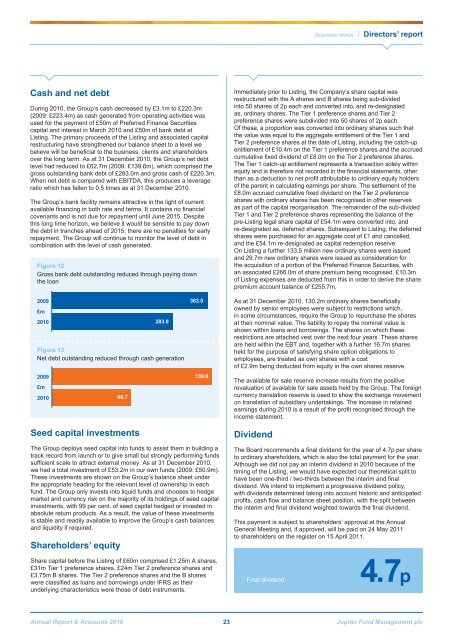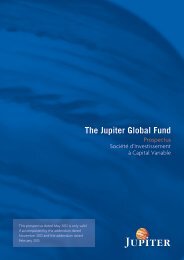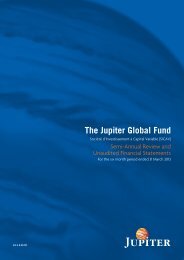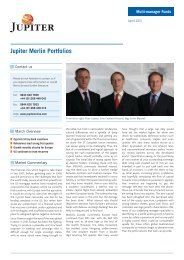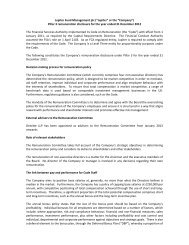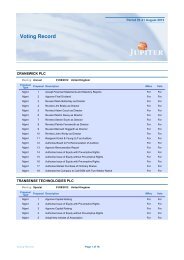Jupiter Annual Report 2010 - Jupiter Asset Management
Jupiter Annual Report 2010 - Jupiter Asset Management
Jupiter Annual Report 2010 - Jupiter Asset Management
Create successful ePaper yourself
Turn your PDF publications into a flip-book with our unique Google optimized e-Paper software.
Business review | Directors’ report<br />
Cash and net debt<br />
During <strong>2010</strong>, the Group’s cash decreased by £3.1m to £220.3m<br />
(2009: £223.4m) as cash generated from operating activities was<br />
used for the payment of £50m of Preferred Finance Securities<br />
capital and interest in March <strong>2010</strong> and £50m of bank debt at<br />
Listing. The primary proceeds of the Listing and associated capital<br />
restructuring have strengthened our balance sheet to a level we<br />
believe will be beneficial to the business, clients and shareholders<br />
over the long term. As at 31 December <strong>2010</strong>, the Group’s net debt<br />
level had reduced to £62.7m (2009: £139.6m), which comprised the<br />
gross outstanding bank debt of £283.0m and gross cash of £220.3m.<br />
When net debt is compared with EBITDA, this produces a leverage<br />
ratio which has fallen to 0.5 times as at 31 December <strong>2010</strong>.<br />
The Group’s bank facility remains attractive in the light of current<br />
available financing in both rate and terms. It contains no financial<br />
covenants and is not due for repayment until June 2015. Despite<br />
this long time horizon, we believe it would be sensible to pay down<br />
the debt in tranches ahead of 2015; there are no penalties for early<br />
repayment. The Group will continue to monitor the level of debt in<br />
combination with the level of cash generated.<br />
Figure 12<br />
Gross bank debt outstanding reduced through paying down<br />
the loan<br />
Immediately prior to Listing, the Company’s share capital was<br />
restructured with the A shares and B shares being sub-divided<br />
into 50 shares of 2p each and converted into, and re-designated<br />
as, ordinary shares. The Tier 1 preference shares and Tier 2<br />
preference shares were subdivided into 50 shares of 2p each.<br />
Of these, a proportion was converted into ordinary shares such that<br />
the value was equal to the aggregate entitlement of the Tier 1 and<br />
Tier 2 preference shares at the date of Listing, including the catch-up<br />
entitlement of £10.4m on the Tier 1 preference shares and the accrued<br />
cumulative fixed dividend of £8.0m on the Tier 2 preference shares.<br />
The Tier 1 catch-up entitlement represents a transaction solely within<br />
equity and is therefore not recorded in the financial statements, other<br />
than as a deduction to net profit attributable to ordinary equity holders<br />
of the parent in calculating earnings per share. The settlement of the<br />
£8.0m accrued cumulative fixed dividend on the Tier 2 preference<br />
shares with ordinary shares has been recognised in other reserves<br />
as part of the capital reorganisation. The remainder of the sub-divided<br />
Tier 1 and Tier 2 preference shares representing the balance of the<br />
pre-Listing legal share capital of £54.1m were converted into, and<br />
re-designated as, deferred shares. Subsequent to Listing, the deferred<br />
shares were purchased for an aggregate cost of £1 and cancelled,<br />
and the £54.1m re-designated as capital redemption reserve.<br />
On Listing a further 133.5 million new ordinary shares were issued<br />
and 29.7m new ordinary shares were issued as consideration for<br />
the acquisition of a portion of the Preferred Finance Securities, with<br />
an associated £266.0m of share premium being recognised. £10.3m<br />
of Listing expenses are deducted from this in order to derive the share<br />
premium account balance of £255.7m.<br />
2009<br />
£m<br />
<strong>2010</strong><br />
283.0<br />
Figure 13<br />
Net debt outstanding reduced through cash generation<br />
2009<br />
£m<br />
<strong>2010</strong><br />
68.7<br />
363.0<br />
139.6<br />
As at 31 December <strong>2010</strong>, 130.2m ordinary shares beneficially<br />
owned by senior employees were subject to restrictions which,<br />
in some circumstances, require the Group to repurchase the shares<br />
at their nominal value. The liability to repay the nominal value is<br />
shown within loans and borrowings. The shares on which these<br />
restrictions are attached vest over the next four years. These shares<br />
are held within the EBT and, together with a further 16.7m shares<br />
held for the purpose of satisfying share option obligations to<br />
employees, are treated as own shares with a cost<br />
of £2.9m being deducted from equity in the own shares reserve.<br />
The available for sale reserve increase results from the positive<br />
revaluation of available for sale assets held by the Group. The foreign<br />
currency translation reserve is used to show the exchange movement<br />
on translation of subsidiary undertakings. The increase in retained<br />
earnings during <strong>2010</strong> is a result of the profit recognised through the<br />
income statement.<br />
Seed capital investments<br />
The Group deploys seed capital into funds to assist them in building a<br />
track record from launch or to give small but strongly performing funds<br />
sufficient scale to attract external money. As at 31 December <strong>2010</strong>,<br />
we had a total investment of £53.2m in our own funds (2009: £50.9m).<br />
These investments are shown on the Group’s balance sheet under<br />
the appropriate heading for the relevant level of ownership in each<br />
fund. The Group only invests into liquid funds and chooses to hedge<br />
market and currency risk on the majority of its holdings of seed capital<br />
investments, with 99 per cent. of seed capital hedged or invested in<br />
absolute return products. As a result, the value of these investments<br />
is stable and readily available to improve the Group’s cash balances<br />
and liquidity if required.<br />
Shareholders’ equity<br />
Dividend<br />
The Board recommends a final dividend for the year of 4.7p per share<br />
to ordinary shareholders, which is also the total payment for the year.<br />
Although we did not pay an interim dividend in <strong>2010</strong> because of the<br />
timing of the Listing, we would have expected our theoretical split to<br />
have been one-third / two-thirds between the interim and final<br />
dividend. We intend to implement a progressive dividend policy,<br />
with dividends determined taking into account historic and anticipated<br />
profits, cash flow and balance sheet position, with the split between<br />
the interim and final dividend weighted towards the final dividend.<br />
This payment is subject to shareholders’ approval at the <strong>Annual</strong><br />
General Meeting and, if approved, will be paid on 24 May 2011<br />
to shareholders on the register on 15 April 2011.<br />
Share capital before the Listing of £60m comprised £1.25m A shares,<br />
£31m Tier 1 preference shares, £24m Tier 2 preference shares and<br />
£3.75m B shares. The Tier 2 preference shares and the B shares<br />
were classified as loans and borrowings under IFRS as their<br />
underlying characteristics were those of debt instruments.<br />
Final dividend:<br />
4.7p<br />
<strong>Annual</strong> <strong>Report</strong> & Accounts <strong>2010</strong> 23 <strong>Jupiter</strong> Fund <strong>Management</strong> plc


